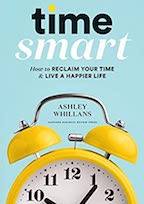Study Finds Academic and Professional Women Are Less Likely to Ask for Extensions to Complete Tasks
Posted on Nov 10, 2021 | Comments 0
 A new study led by Ashley V. Whillans, an assistant professor in the Negotiation, Organizations & Markets Unit at Harvard Business Schools, finds that in professional and academic settings women avoid asking for more time to complete work tasks, even when deadlines are explicitly adjustable, undermining their well-being and task performance. Women’s discomfort in asking for more time on adjustable deadlines uniquely predicts time stress and burnout, even when controlling for marital status, industry, and tenure.
A new study led by Ashley V. Whillans, an assistant professor in the Negotiation, Organizations & Markets Unit at Harvard Business Schools, finds that in professional and academic settings women avoid asking for more time to complete work tasks, even when deadlines are explicitly adjustable, undermining their well-being and task performance. Women’s discomfort in asking for more time on adjustable deadlines uniquely predicts time stress and burnout, even when controlling for marital status, industry, and tenure.
Time stress — the feeling of having too many things to do and not enough time to do them — is a societal epidemic that compromises productivity, physical health, and emotional well-being. Research shows that gender differences in experienced time stress is partially driven by women having more work than men. At home, working women in heterosexual marriages in the United States are the primary managers of domestic life and childcare, completing an average of eight more hours of chores and childcare each week as compared to men. At work, women take on more activities outside of formally defined responsibilities both voluntarily and due to more frequent requests. As a result, women end up with a greater task load relative to men.
In a series of nine studies, researchers found that women are less likely to ask for more time to complete their tasks because they hold stronger beliefs that they will be penalized for these requests and worry more about burdening others. They also found no evidence that women are judged more harshly than men when they ask to extend a deadline to complete a task.
 As a result, the authors propose that reducing ambiguity about whether or not asking for an extension is an acceptable behavior by establishing a formal policy around extension requests could mitigate the proposed gender differences in asking for more time on adjustable deadlines at work.
As a result, the authors propose that reducing ambiguity about whether or not asking for an extension is an acceptable behavior by establishing a formal policy around extension requests could mitigate the proposed gender differences in asking for more time on adjustable deadlines at work.
Dr. Whillans is the author of Time Smart: How to Reclaim Your Time and Live a Happier Life (Harvard Business School Press, 2020). She holds a bachelor’s degree in psychology and a master’s degree and a Ph.D. in social psychology, all from the University of British Columbia. Before joining the faculty at Harvard Business School in 2017, Dr. Whillans was a visiting scholar and guest lecturer at the University of Chicago Booth School of Business.
The full study, “Extension Request Avoidance Predicts Greater Time Stress Among Women,” was published in the Proceedings of the National Academies of Science. It may be accessed here.
Filed Under: Research/Study








